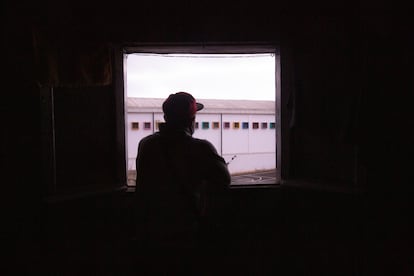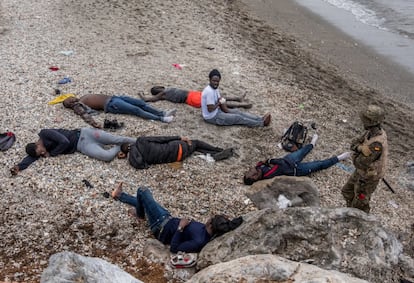Yemeni asylum seekers deported from Ceuta: ‘After beating us up, they threw us out’
Four people who entered the exclave city in mid-May say they were forcibly returned to Morocco, contradicting the Interior Ministry’s claims that all expulsions were carried out in accordance with the law

Between May 17 and 18, a civil servant, two workers from a pen manufacturing company and an accountant-turned-cab driver made it to the Spanish North African city of Ceuta, having slipped past the Moroccan guards who were rumored to be taking a lax attitude to border control, reportedly in response to Spain’s decision to offer medical treatment to the founder of an outlawed liberation movement for the Sahrawi people in the parts of Western Sahara that are under Moroccan control.
The four Yemenis were among the nearly 8,000 migrants who entered the Spanish exclave irregularly in mid-May, in what became an unprecedented migration crisis on the border – never before had so many arrived in such a short space of time and almost half were immediately expelled in many cases without the proper formalities.
I thought that I would be treated differently coming from a country at warHussein, an accountant who worked as a cab driver in Yemen
Fleeing a war-torn country where 80% of the population is in need of humanitarian aid, the four Yemenis addressed the Spanish authorities shouting “Yemeni, asylum! Yemeni, asylum!” In less than 24 hours, the four were beaten and dragged back to the border, according to their accounts told to EL PAÍS from Morocco.
Last Friday, Interior Minister Fernando Grande-Marlaska insisted once again that the more than 7,000 deportations that took place during the crisis – including voluntary departures – were carried out within the boundaries of the law. He also mentioned that the United Nations High Commissioner for Refugees (UNHCR) was present in the border area “from the start” to help state security forces identify the most vulnerable migrants. Potential refugees, such as the four Yemenis, are entitled to special protection recognized under Spanish law and the international conventions that Spain has signed. They cannot be deported before their asylum claim is assessed.
Following Marlaska’s statement, UNHCR quickly dissociated itself, declaring: “We cannot confirm that all the returns have been made voluntarily or in accordance with the law, since we have received a number of accounts from people who had expressed their interest in seeking asylum but were forcibly and, in some cases, violently returned.” After learning of these “concerning events regarding international protection,” the organization formally requested Spanish authorities open an investigation. Sources at the Interior Ministry insisted that they are not aware of any such request. “The Interior Ministry is always available and will collaborate fully with any investigation opened on possible irregular events,” the same sources maintained. The Public Prosecutor for Youth in Ceuta, meanwhile, is investigating the so-called “expressed deportations” of minors.

Khaled, for instance, said he was dragged back across the border into Morocco, despite being identified as a potential refugee by UNHCR. The 28-year-old civil servant fled Yemen at the outbreak of war in 2015, and entered Ceuta via Tarajal beach in the early hours of May 18. No-one stopped him and he spent a good part of the night wandering around the city until he decided to approach the facility where the Red Cross was attending to the new arrivals. It was in those chaotic, crowded warehouses that he and two other Yemenis explained their situation to a UNHCR worker. “We told her we wanted to apply for asylum, she took a picture of our passports, we watched as she talked about us to the police and army chiefs and she told us to be calm,” Khaled said during a video call with EL PAÍS. “But when she left, two soldiers and five policemen arrived to tell us off for speaking to UNHCR.” He claimed they were told: “Now it’s back to Morocco!”
According to Khaled, just after 8pm on May 18, the military forcibly returned the three from the Red Cross center. “On the way to the border fence [separating Ceuta from Morocco], they pushed us and hit us with their batons,” he explained. “We showed our passports and shouted ‘asylum’ to them, but it made no difference.” Questioned about these actions, the Defense Ministry declined to comment.
Khaled’s case has also been taken on by the NGO, Coordinadora de Barrios (Coordinating Neighborhoods), which has denounced the forced expulsions of asylum seekers to the Spanish ombudsman. The organization has also interviewed six other Yemenis, three of whom relate similar accounts to EL PAÍS.
Ahmed, 32, and Amar, 39, who worked in the marketing department of a pen company, fled Yemen together in 2019. “The options there are limited,” said Ahmed. “Either you are part of the war or you leave.” The pair’s plan was actually to enter Spain through the other Spanish North African city of Melilla, but they saw on Facebook that the borders would be open in Ceuta and they took a cab from Nador to Castillejos, entering Ceuta on Monday 17. “When we arrived, we searched for a place where we could find help,” said Amar. “Our clothes were wet, we were hungry and very tired.”
The soldiers beat us with batons, threw us to the ground and stepped on our backsAhmed, who use to work at pen manufactoring company in Yemen
Amar and Ahmed also ended up in the Red Cross facility in the Tarajal industrial park. “The soldiers beat us with batons, threw us to the ground and stepped on our backs. After beating us up, they threw us out,” said Ahmed, who maintains they showed their passports and shouted “Asylum, Yemeni!” on several occasions in Spanish.
Hussein, 27, an accountant who worked as a cab driver in Yemen, also claims that he was forcibly deported. He swam to Ceuta with Khaled, but the pair became separated once in the city. “I was attacked and beaten,” he said. “A military man pointed a gun at me and sprayed a red substance. It smelled like pepper.” He ended up meeting his compatriots on the other side of the border. “I thought that I would be treated differently coming from a country at war,” he said.
Aside from the Yemenis, several women from the Democratic Republic of Congo, accompanied by at least three children, reported their expulsion to the NGO, Coordinadora de Barrios. Their lawyer, Patricia Fernández Vicens, maintained that the deportations carried out in Ceuta violated the Geneva Convention for refugees and the UN Convention on the Rights of the Child, as well as Spanish law itself. “What happened in Ceuta shows that it is not possible to carry out expulsions at the border, or the so-called ‘express deportations,’ with the proper guarantees,” she said.
English version by Heather Galloway.
Tu suscripción se está usando en otro dispositivo
¿Quieres añadir otro usuario a tu suscripción?
Si continúas leyendo en este dispositivo, no se podrá leer en el otro.
FlechaTu suscripción se está usando en otro dispositivo y solo puedes acceder a EL PAÍS desde un dispositivo a la vez.
Si quieres compartir tu cuenta, cambia tu suscripción a la modalidad Premium, así podrás añadir otro usuario. Cada uno accederá con su propia cuenta de email, lo que os permitirá personalizar vuestra experiencia en EL PAÍS.
¿Tienes una suscripción de empresa? Accede aquí para contratar más cuentas.
En el caso de no saber quién está usando tu cuenta, te recomendamos cambiar tu contraseña aquí.
Si decides continuar compartiendo tu cuenta, este mensaje se mostrará en tu dispositivo y en el de la otra persona que está usando tu cuenta de forma indefinida, afectando a tu experiencia de lectura. Puedes consultar aquí los términos y condiciones de la suscripción digital.









































